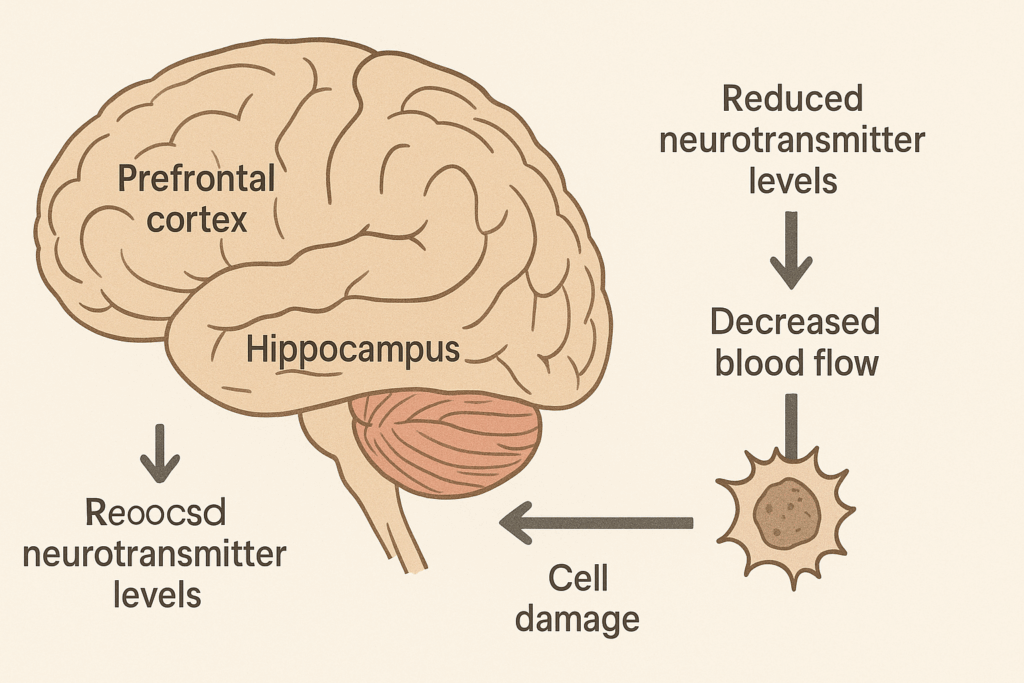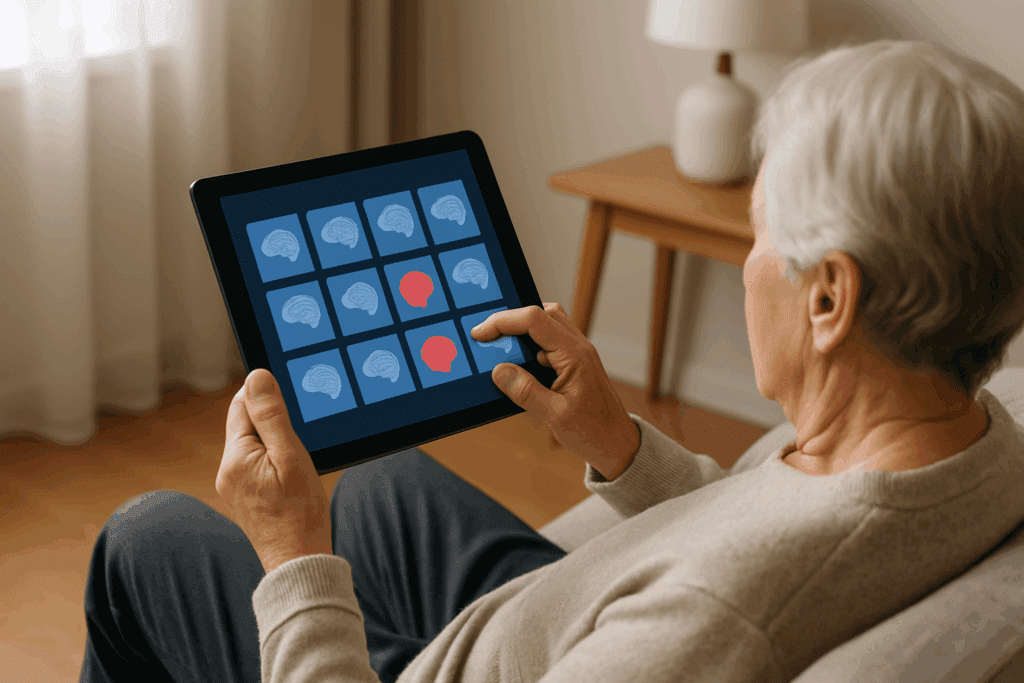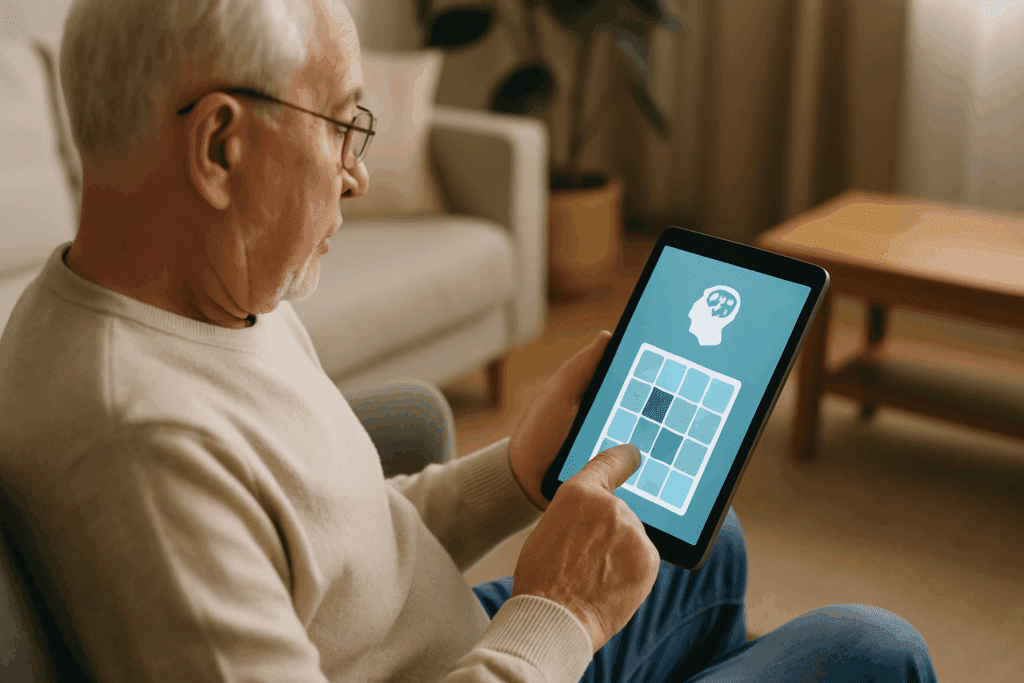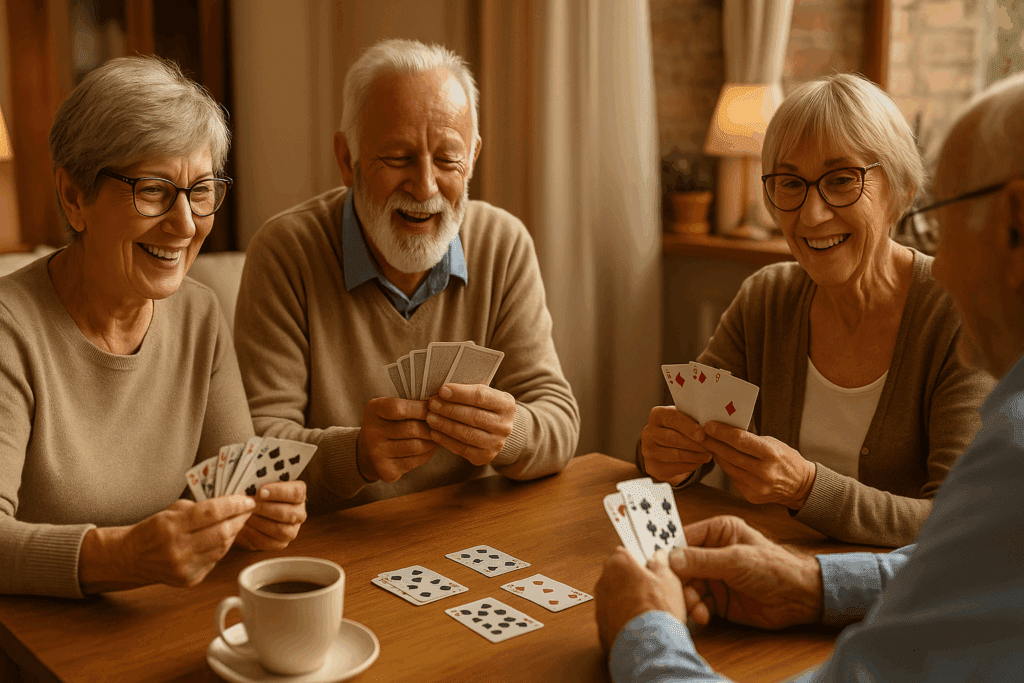Why Cognitive Health After 60 Deserves Special Attention
Aging is a natural process, but its effects on the brain can vary greatly between individuals. While some people in their 60s continue to thrive intellectually, others may begin to notice lapses in memory, attention, and problem-solving abilities. These changes are not necessarily signs of dementia but may reflect normal age-related cognitive decline. That said, the brain retains a remarkable capacity for neuroplasticity, or the ability to adapt and rewire itself. This means that memory games for seniors and brain training exercises for the elderly can play a critical role in preserving mental sharpness well into later life.
Current research highlights the importance of mental stimulation, particularly in the form of brain exercises for memory in the elderly. These activities help reinforce existing neural connections and support the creation of new ones. Engaging regularly in brain play for seniors can enhance cognitive resilience and delay the onset of age-related cognitive impairments. Memory loss is not inevitable, and a proactive approach can yield tangible cognitive benefits.
With more seniors seeking ways to maintain independence and improve quality of life, the demand for free brain games for seniors and other memory-enhancing strategies has never been greater. These tools are no longer just entertaining pastimes—they’re key components of a science-backed approach to aging well. As we’ll explore, the best memory games for seniors do more than pass time; they help keep the mind agile, adaptive, and connected to the world.
You may also like: Boost Brain Power Naturally: Evidence-Based Cognitive Training Activities and Memory Exercises That Support Long-Term Mental Health

Understanding Age-Related Cognitive Decline
Memory, attention, and executive function are some of the key areas affected by aging. While these changes are often subtle, they can have meaningful effects on daily life. For instance, forgetting names, misplacing items, or struggling to find the right word can become increasingly common in older adulthood. Although these challenges are usually benign, they can cause frustration and anxiety, especially for individuals who once prided themselves on mental acuity.
The biological basis of cognitive decline involves changes in brain volume, especially in regions like the hippocampus, which is vital for memory formation. Decreases in neurotransmitter levels, reduced blood flow to the brain, and the accumulation of cellular damage over time also contribute to this process. However, this does not mean cognitive decline is beyond our control. By incorporating mind games for seniors and other cognitive exercises into a daily routine, it is possible to slow or even reverse some of these changes.
When selecting brain games for older adults, it is essential to focus on activities that engage multiple domains of cognition. Tasks that involve memory retrieval, pattern recognition, decision-making, and language processing can all stimulate different regions of the brain. Moreover, brain fitness for seniors is optimized when activities are varied, enjoyable, and progressively challenging.

The Science Behind Brain Training for Seniors
There is growing evidence that structured brain training for seniors leads to measurable improvements in cognitive function. Longitudinal studies, including the well-known ACTIVE (Advanced Cognitive Training for Independent and Vital Elderly) trial, have shown that cognitive training can enhance processing speed, memory, and reasoning skills in adults over 65. These gains were not only sustained over several years but were also linked to improved daily functioning.
Brain training exercises for the elderly work by strengthening neural circuits through repetition and reinforcement. Just as muscles grow stronger with regular physical workouts, the brain becomes more efficient and resilient when exercised regularly. This is especially important for areas of the brain that are vulnerable to decline, such as the prefrontal cortex and hippocampus.
Cognitive games for seniors often mimic real-world challenges to improve skills that are essential for independent living. For example, free memory games for seniors that involve remembering shopping lists, navigating virtual environments, or managing time-sensitive tasks simulate everyday scenarios. These exercises help maintain both practical abilities and overall mental clarity, providing tangible benefits that extend beyond the screen or tabletop.

Top Digital Brain Games for Seniors: What Works and Why
In recent years, the market for digital brain games has exploded, offering seniors a wide range of engaging and accessible tools. From apps to computer-based platforms, there are now countless options available to support brain fitness for seniors. Importantly, the best memory games for seniors are those that are both enjoyable and grounded in scientific principles.
Programs like Lumosity, Elevate, BrainHQ, and CogniFit offer customized training modules that adapt to the user’s skill level. These platforms provide brain training for elderly users in a way that is dynamic, measurable, and user-friendly. Studies have shown that participants who use such platforms consistently see improvements in specific cognitive domains such as working memory, attention span, and language fluency.
In addition to paid programs, there are numerous free brain games for seniors available online. These range from classic memory card games to more complex puzzle-solving challenges. What makes these tools particularly effective is their ability to engage users emotionally and intellectually. Seniors are more likely to stick with games that are fun, aesthetically pleasing, and socially interactive. Platforms that offer free games for seniors with multiplayer or community features can also foster social connection—another protective factor for brain health.

Classic Mind Games for Seniors That Stand the Test of Time
While digital tools are incredibly effective, traditional brain games for seniors still have an important place in cognitive health routines. Crosswords, Sudoku, chess, and card games like Bridge or Rummy are time-tested options that stimulate the brain in meaningful ways. These classic games involve logic, strategy, memory, and attention, all of which are critical components of brain fitness for seniors.
Playing these games regularly can improve both short-term and long-term memory. For example, Sudoku encourages pattern recognition and logical sequencing, while crosswords enhance verbal fluency and general knowledge. Moreover, these games often provide a tactile, social experience that enhances their cognitive benefits. Gathering weekly to play with friends or family adds a layer of emotional enrichment that strengthens neural connections.
Card games, in particular, can be tailored to suit a variety of cognitive abilities and preferences. For seniors dealing with early cognitive changes, simplified versions of memory games for elderly individuals can help maintain focus without causing frustration. These adaptations ensure that the game remains engaging while still offering the necessary cognitive challenge to support mental sharpness.

Creative Brain Play for Seniors Through Arts and Hobbies
Beyond structured games, creative expression is a powerful avenue for brain stimulation. Engaging in the arts—whether painting, music, dance, or crafting—activates multiple brain regions simultaneously. These activities encourage new neural pathways to form and help preserve emotional memory, executive function, and motor coordination.
For instance, learning to play a musical instrument or joining a choir requires a combination of auditory processing, memory recall, and fine motor skills. Similarly, painting or pottery demands visual-spatial reasoning and creativity. These forms of brain play for seniors offer not only cognitive stimulation but also a profound sense of purpose and joy.
Incorporating creative hobbies into a regular routine serves as both a preventive and therapeutic approach to cognitive aging. Research has shown that seniors who engage in creative pursuits have a lower risk of developing dementia and other neurodegenerative conditions. Furthermore, these activities can easily be modified to become free mind games for elderly individuals by using household materials or following online tutorials. The accessibility and adaptability of creative exercises make them invaluable tools in any brain health strategy.

Social Interaction as a Cognitive Workout
One of the most underrated forms of brain training for seniors is regular social engagement. Conversations, storytelling, group problem-solving, and collaborative games all require real-time thinking, memory retrieval, and emotional processing. These interactions naturally integrate cognitive skills in a way that is seamless and enjoyable.
Seniors who remain socially active tend to perform better on cognitive assessments and report greater mental well-being. Social interaction helps reduce stress, a factor known to impair memory and executive function over time. Moreover, games that involve group participation—such as trivia nights, charades, or Pictionary—can function as both memory exercises for elderly individuals and opportunities for meaningful connection.
Community centers, senior living facilities, and virtual forums now offer a wide variety of cognitive games for seniors that encourage group play. Whether through book clubs, discussion groups, or cooperative board games, these environments nurture both brain fitness and emotional resilience. The best memory games for seniors are often those that involve others, reinforcing the idea that mental health thrives in community.
Cognitive Exercises for Seniors With Mobility or Sensory Challenges
It’s important to recognize that not all seniors have the same physical or sensory capabilities. Fortunately, there are many cognitive exercises for seniors that can be adapted for those with mobility limitations or visual and auditory impairments. Voice-activated apps, large-print puzzles, and tactile games can help ensure that all older adults have access to quality brain training.
Free memory games for seniors that utilize speech recognition or simplified interfaces provide an inclusive approach to cognitive stimulation. For example, programs that read questions aloud and allow verbal responses are particularly useful for individuals with visual impairments. Likewise, physical card games with textured surfaces can enhance brain training exercises for the elderly who benefit from tactile feedback.
It’s equally vital to consider the emotional well-being of individuals facing physical challenges. Feeling capable and included significantly enhances motivation and participation. By tailoring memory exercises for seniors to match individual abilities, caregivers and loved ones can create an empowering environment that supports brain fitness for seniors without compromise.
Nutrition, Sleep, and Lifestyle Factors That Enhance Cognitive Training
While brain games and cognitive exercises are essential, they function best when supported by a healthy lifestyle. Nutrition plays a foundational role in brain health, with diets rich in antioxidants, omega-3 fatty acids, and B vitamins supporting cognitive resilience. Regular physical activity also enhances blood flow to the brain, thereby improving the effectiveness of memory games for seniors.
Sleep is another crucial factor. Adequate rest supports memory consolidation and emotional regulation. Seniors engaging in brain training for elderly individuals should prioritize consistent sleep schedules and address any underlying sleep disorders, such as sleep apnea or insomnia, that may interfere with cognitive recovery.
Stress management, hydration, and avoiding neurotoxins like tobacco and excessive alcohol further contribute to mental clarity. Integrating lifestyle changes with memory exercises for elderly individuals creates a holistic approach that addresses both the symptoms and underlying contributors to cognitive decline. In this integrated model, the best memory games for seniors become even more effective tools for lifelong brain health.
How to Choose the Right Brain Games for Your Needs
Selecting appropriate brain games for old people requires an understanding of individual preferences, goals, and cognitive profiles. Some seniors may gravitate toward linguistic challenges, while others may enjoy mathematical puzzles or visual-spatial tasks. The key is to find games that offer the right level of difficulty—neither too easy to be boring nor too hard to be discouraging.
Trial and error can be an effective strategy in identifying the most engaging activities. Many platforms offer free trials or free games for seniors that can be explored before committing to a routine. Additionally, caregivers and family members can help identify patterns of engagement and adjust options accordingly. Games that are revisited frequently are often the ones that strike the right cognitive and emotional balance.
Ultimately, the best memory games for seniors are those that are sustainable. Enjoyment and habit formation are essential to long-term cognitive training. When seniors look forward to their brain exercises for memory and elderly well-being, the practice becomes an integrated part of daily life rather than a chore. This internal motivation is what transforms occasional gameplay into a lifelong brain-boosting habit.
Frequently Asked Questions: Brain Games and Cognitive Fitness for Seniors
1. How can seniors integrate brain games into their everyday routines without it feeling like a chore?
Incorporating brain games for seniors into daily life doesn’t have to be a rigid or time-consuming task. In fact, one of the most effective strategies is to blend brain exercises for memory elderly individuals with other routine habits. For example, pairing memory games with a morning cup of tea or dedicating 10 minutes after lunch to brain play for seniors can make these activities feel more like relaxation than responsibility. Scheduling a friendly game of cards or completing a crossword puzzle while watching the news are seamless ways to engage in cognitive stimulation. Over time, these consistent habits reinforce brain training for elderly users without adding undue stress or pressure.
To maintain engagement, it helps to rotate different brain games for older adults throughout the week. Some days might focus on memory matching tasks, while others might involve logic puzzles, visual-spatial challenges, or mind games for seniors that encourage pattern recognition. The variety keeps cognitive exercises fresh and prevents mental fatigue. Additionally, many free brain games for seniors are available as mobile apps or browser-based games, allowing for quick access when traveling or waiting for appointments. The key is to associate these games with pleasure and purpose, not pressure.
Another approach involves inviting others to join the fun. Playing brain games for seniors in a group setting not only adds a social dimension but also increases the likelihood of making these games a routine part of one’s lifestyle. Whether it’s online multiplayer games or in-person gatherings, this integration of memory games for elderly free of charge helps ensure consistent mental activity. Seniors who personalize their cognitive routines often report greater enjoyment and long-term adherence. In the end, the best memory games for seniors are those that feel less like tasks and more like treasured parts of the day.
2. What types of brain training exercises are best suited for seniors who live with mild cognitive impairment (MCI)?
For seniors with mild cognitive impairment, it’s crucial to choose brain training exercises for the elderly that are both accessible and adaptable. While many cognitive games for seniors target broad mental faculties, individuals with MCI often benefit from exercises that emphasize memory recall, attention span, and task sequencing. These areas are typically the first to show signs of decline and thus become the focal point of brain training for seniors facing early cognitive changes. Mind exercises for elderly individuals in this group should prioritize consistency over complexity.
Free memory games for seniors that use spaced repetition techniques can be particularly helpful. For instance, digital platforms that incorporate recall-based quizzes and flashcards encourage long-term memory retention. Similarly, analog games like matching tiles or number-sequencing puzzles engage both recognition and recall without being overwhelming. Many free mind games for elderly individuals are now designed with adjustable difficulty levels, which is especially beneficial for those with MCI. This allows users to tailor their experience without losing confidence or interest.
Visual cues, large-print formats, and audio prompts also enhance accessibility. Brain games for elderly players with MCI should avoid time pressures or overly complex rules, which can lead to confusion or frustration. Instead, successful cognitive exercises for seniors in this category tend to reinforce existing skills while introducing gentle cognitive challenges. Caregivers can assist by providing encouragement and creating an emotionally supportive atmosphere.
It’s also worth noting that engaging in brain games for seniors free download apps that offer progress tracking can provide insights into improvement over time. These metrics can be motivational and help clinicians adjust treatment plans. In sum, the best brain exercises for memory elderly users with MCI are those that promote confidence, focus on personal achievement, and support mental resilience without overstimulation.
3. Are there any brain games that combine physical movement with cognitive training for seniors?
Yes, combining physical activity with brain exercises for seniors is not only possible but highly recommended. This dual-task approach—often referred to as “motor-cognitive training”—offers compounded benefits for brain health, balance, and mobility. Games that engage both the body and the mind can be particularly effective for promoting neuroplasticity and functional independence. For instance, dance-based video games that require users to mimic sequences serve as both memory games for elderly participants and physical workouts. These activities help bridge the gap between sedentary brain training and active movement.
In community centers, movement-based mind games for seniors are often integrated into group fitness classes. For example, participants may be asked to walk in patterns, recall specific steps, or solve math problems while performing coordinated movements. This type of brain play for seniors is not only enjoyable but also reinforces hand-eye coordination and executive function. Additionally, programs like Tai Chi or chair yoga often include cognitive cues to encourage focus and mental engagement.
Technology is also catching up with this trend. Wearable devices and smart fitness platforms now offer interactive brain training for elderly users that combines memory tasks with movement prompts. These systems guide participants through timed exercises that might involve clapping in rhythm, identifying shapes while stepping in place, or completing light resistance exercises while responding to verbal challenges.
Even simple daily activities—like gardening or cooking—can become opportunities for free brain games for seniors when coupled with memory tasks such as remembering recipes or identifying plant species. The goal is to create a multisensory experience that stimulates both the brain and body simultaneously. In this context, brain games for old people become more dynamic and impactful, promoting holistic brain fitness for seniors who benefit from active engagement on multiple levels.
4. How can caregivers encourage reluctant seniors to try memory exercises or cognitive games?
Motivating seniors to engage in brain exercises for memory elderly adults can be challenging, especially if the individual is skeptical or unfamiliar with the concept of cognitive training. One effective strategy is to reframe these activities as fun and purposeful rather than clinical or obligatory. Instead of labeling them as “brain games for seniors,” caregivers might refer to them as puzzles, hobbies, or social activities. The language used can significantly influence perception and willingness to participate.
Introducing games that align with the senior’s interests also makes a substantial difference. For instance, someone who enjoys history might be drawn to trivia games, while a former accountant may appreciate logic-based number puzzles. Brain games for older adults should be selected with personal preferences in mind, allowing individuals to experience a sense of ownership over the activity. Offering options that feel familiar—such as card games or crosswords—can also help ease the transition into more structured cognitive exercises for seniors.
Caregivers can foster motivation by participating in the activities themselves. Co-playing free games for seniors encourages bonding, reduces anxiety, and demonstrates that the exercise is enjoyable rather than evaluative. Additionally, setting realistic and non-competitive goals removes the fear of failure, which is a common barrier to trying new mind exercises for elderly individuals.
In some cases, offering rewards or positive reinforcement may be helpful. Whether it’s a small treat, verbal praise, or simply acknowledgment of effort, these gestures can significantly boost morale. Free mind games for elderly users that offer visual progress tracking or achievements are particularly effective in maintaining motivation. The best memory games for seniors are those that elicit joy and self-efficacy. Once the activity feels meaningful, reluctance often gives way to curiosity—and eventually, routine.
5. How do brain games compare to traditional memory aids like journaling or using reminders?
While both brain games and memory aids play important roles in cognitive support, their functions are fundamentally different. Brain games for seniors are designed to actively challenge and stimulate neural pathways, whereas memory aids like notes, alarms, or journaling serve as compensatory tools to bypass cognitive limitations. In other words, brain exercises for seniors aim to strengthen cognitive function, while memory aids help manage the symptoms of decline.
That said, the two approaches are not mutually exclusive. In fact, they often work best when used together. For instance, seniors might use a journal to record progress in free memory games for seniors or to reflect on strategies that improved performance. Likewise, reminders can be used to prompt participation in daily brain training for elderly users, ensuring consistency and accountability.
Traditional tools like to-do lists and calendars are excellent for external memory support, especially in cases of mild forgetfulness or early-stage cognitive decline. However, these tools don’t necessarily enhance underlying cognitive abilities. That’s where memory exercises for elderly individuals come into play. By practicing recall, sequencing, and reasoning through cognitive games for seniors, individuals can build resilience and potentially reduce reliance on external supports.
Moreover, brain fitness for seniors benefits from the emotional engagement offered by games. Unlike passive memory aids, engaging with brain games for elderly players often elicits laughter, competition, or social interaction—all of which contribute to improved cognitive outcomes. When used in tandem, these tools offer a robust framework for maintaining both independence and mental acuity. The best strategy is to use brain games for old people as part of a broader, personalized memory management plan.
6. Can brain games help reduce the risk of dementia or Alzheimer’s disease in seniors?
While brain games for seniors are not a cure or guaranteed preventive measure for dementia or Alzheimer’s disease, they are considered valuable tools in reducing risk and delaying onset. Regular engagement with brain training exercises for seniors helps preserve cognitive reserve—the brain’s capacity to function effectively despite age-related changes or pathology. A well-maintained cognitive reserve is linked to a reduced likelihood of clinical symptoms even in the presence of early neurodegeneration.
Brain exercises for memory elderly individuals serve as proactive measures that promote neuroplasticity. This adaptability allows the brain to reorganize itself in response to new challenges, which can help maintain function even when certain areas begin to decline. For example, seniors who engage in memory games for elderly free of cost or use free brain games for seniors on a regular basis are more likely to preserve executive function and short-term memory.
Importantly, cognitive games for seniors should be one part of a broader brain health strategy that includes nutrition, exercise, stress management, and social engagement. Mind exercises for elderly users are most effective when integrated into a balanced lifestyle that addresses multiple risk factors. Studies suggest that even modest improvements in mental activity can lead to noticeable benefits over time, especially when combined with other protective behaviors.
While there is no definitive evidence that memory exercises for seniors can prevent Alzheimer’s disease outright, they are strongly associated with improved quality of life and a slower rate of cognitive decline. Early adoption of brain training for elderly individuals is particularly important, as it builds a foundation for long-term mental resilience. Ultimately, the best memory games for seniors offer an enjoyable and accessible way to promote lifelong cognitive health.
7. What are some overlooked sources of free brain games for seniors that are not app-based?
In an age dominated by smartphones and tablets, it’s easy to overlook offline opportunities for free brain games for seniors that require nothing more than a pen, paper, or a deck of cards. Libraries remain one of the most underutilized resources for free games for seniors. Many offer puzzles, books of brain teasers, and rotating collections of crosswords or Sudoku. Community centers and senior clubs often host weekly game nights that include everything from Bingo to Pictionary—both of which double as brain games for elderly participants.
Newspapers and magazines are another often-overlooked source of memory exercises for elderly individuals. Many publications feature daily or weekly puzzles that challenge logic, language, and memory. Engaging with these resources offers a tactile and screen-free alternative to app-based games, which some seniors may find more comfortable and familiar. Creating a personal collection of puzzles or sharing clippings with friends can also build a collaborative atmosphere around cognitive wellness.
Another rich source of mind games for seniors includes classic board games. Titles like Scrabble, Checkers, and Clue require planning, strategy, and vocabulary—all of which engage different parts of the brain. These games are often available at minimal cost from thrift stores or community swaps. Hosting family game nights or intergenerational game clubs can breathe new life into these traditional tools.
Local universities and adult education centers occasionally offer free workshops on brain play for seniors, including improvisation classes, storytelling games, or creative writing sessions. These programs not only offer structured brain training for elderly users but also introduce social and emotional engagement, further amplifying their benefits. With a little creativity, seniors can access a wealth of cognitive stimulation without ever downloading a single app.
8. How can seniors evaluate whether a brain game is actually effective or just entertainment?
Determining whether a brain game is effective requires more than checking if it’s fun. The most effective brain games for seniors should challenge multiple domains of cognition—such as memory, attention, reasoning, and problem-solving—while also offering a sense of progression or measurable improvement. One sign of effectiveness is if the game gradually increases in difficulty, encouraging the brain to adapt and learn rather than relying on repetition alone.
Evaluating brain training exercises for the elderly can also be guided by self-monitoring. Seniors can track how often they feel mentally sharper or more focused after playing. If a game regularly improves confidence, reaction time, or ability to recall everyday details, it’s likely supporting real cognitive gains. Additionally, games that offer feedback—such as performance scores or improvement charts—are more likely to contribute to brain fitness for seniors.
Educational endorsements and research backing are other important indicators. Some free mind games for elderly users are developed in partnership with neuroscientists or cognitive psychologists, lending them more credibility. Reading user reviews from other seniors or seeking recommendations from occupational therapists can also help identify cognitive games for seniors that are both enjoyable and impactful.
While not every entertaining game will qualify as an effective brain training for elderly adults, it’s also important not to discount enjoyment as a metric. Emotional engagement reinforces memory retention and boosts the brain’s reward system. The best memory games for seniors find a balance between fun and functionality—offering both short-term satisfaction and long-term cognitive benefits.
9. What role does emotional well-being play in the success of memory exercises for seniors?
Emotional well-being is a foundational element of successful memory exercises for seniors. Feelings of stress, loneliness, or depression can impair concentration, reduce motivation, and negatively affect the brain’s ability to form and retain new memories. Conversely, a positive emotional state can enhance the brain’s neurochemical environment, making it more receptive to learning and growth. In this way, brain exercises for memory elderly individuals are more effective when emotional health is also prioritized.
Activities that combine brain play for seniors with emotional engagement—such as storytelling, music, or collaborative puzzles—often yield the most benefit. These mind exercises for elderly users tap into personal meaning, which deepens neural encoding and retention. For example, a game that involves recalling family recipes or identifying childhood photos merges emotional resonance with cognitive stimulation.
Social interaction plays a vital role here as well. Seniors who engage in brain games for old people with peers or loved ones report greater satisfaction and mental clarity. The laughter, bonding, and shared purpose fostered in these environments amplify the effects of memory exercises for seniors by enhancing mood and stress regulation. Additionally, emotional well-being boosts adherence; seniors are more likely to stick with brain training for elderly individuals when the activity feels enjoyable and uplifting.
Mindfulness techniques can further support brain fitness for seniors by reducing cognitive interference from anxiety or rumination. Integrating light meditation before or after memory games for elderly participants can improve focus and information processing. In sum, emotional well-being isn’t a peripheral concern—it’s a powerful lever for maximizing the impact of brain games for elderly users. Supporting emotional health creates the psychological conditions necessary for cognitive training to flourish.
10. What are the future trends in brain training technologies for the aging population?
Brain training technologies for the aging population are advancing rapidly, fueled by innovations in neuroscience, artificial intelligence, and wearable tech. Future brain games for seniors will likely feature greater personalization, adapting in real time to individual performance patterns and emotional states. AI-driven platforms are already being developed that assess not just accuracy, but also attention span, frustration levels, and learning style to optimize each session.
Virtual reality (VR) and augmented reality (AR) are emerging as powerful tools for immersive brain play for seniors. These environments simulate real-world challenges—like navigating a grocery store or recalling landmarks in a neighborhood—in a controlled, gamified format. This hands-on experience enhances the ecological validity of cognitive exercises for seniors and offers engaging alternatives to screen-based games.
Voice assistants and natural language processing technologies will also play a growing role in delivering free memory games for seniors, especially for those with visual or dexterity limitations. Future iterations of brain training exercises for the elderly may involve conversational AI that acts as a cognitive coach, guiding seniors through puzzles, reminding them of past achievements, and suggesting personalized challenges.
Social connectivity will remain central. Multiplayer platforms are evolving to support intergenerational game design, where seniors play alongside younger family members to bridge cognitive training with social interaction. These developments will make brain games for seniors not just tools for mental maintenance, but hubs for emotional bonding and lifelong learning.
As accessibility improves and research deepens, brain training for elderly users will become more integrated into healthcare, with clinicians using data from brain games to guide interventions. The best memory games for seniors in the future won’t just be fun—they’ll be intelligent, adaptive, and therapeutically meaningful.
Conclusion: Final Thoughts on Strengthening Cognitive Vitality Through Brain Games for Seniors
As the aging population continues to grow, so does the importance of promoting cognitive wellness among older adults. The availability of free memory games for seniors, innovative digital platforms, and creative cognitive exercises makes it easier than ever to support brain health after 60. Brain training exercises for seniors, when approached with intention and consistency, can produce lasting improvements in memory, attention, and problem-solving.
Whether it’s engaging in classic games like crosswords and chess, exploring brain games for seniors free download apps, or diving into arts-based brain play for seniors, the options are vast and accessible. Each of these tools serves as more than entertainment—they act as lifelines to cognitive vitality, emotional well-being, and social connection.
Memory games for elderly individuals are not just for those experiencing decline. They are proactive strategies to maintain independence, boost confidence, and enhance quality of life. By incorporating brain exercises for elderly adults into daily routines, we empower seniors to take an active role in preserving their mental sharpness.
There is no one-size-fits-all solution, but with the right combination of brain training for elderly individuals, supportive lifestyle practices, and social engagement, it’s possible to thrive cognitively well into the golden years. Let memory games for old people be the spark that keeps the fire of lifelong learning and vitality burning bright
Further Reading:
31 Best Fun Brain Games For Seniors and Adults [Free to Paid]


